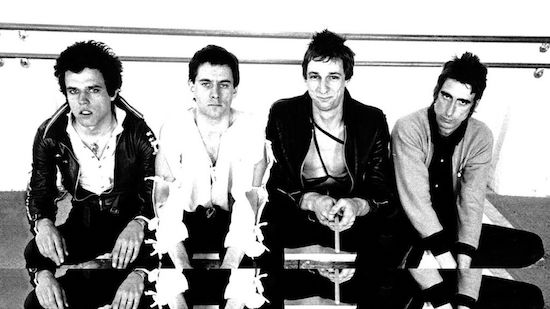I first became Wire-conscious in 1979, when an A & R man from EMI came to listen to the crappy school band I played bass for. Our set consisted, mostly, abysmal Pistols covers, and not even being 16 was an excuse for that, not in 1979, and especially not at a private school. The A & R man, who had clearly been reluctantly roped in by the lead singer’s father (an exec at EMI, was the rumour), was on a fool’s errand and knew it, had bought a box of LPs with him, and the other, more important and cooler band members winnowed through the box, taking all the obvious records.
I was left with a selection of some obvious rank duds – and a promotional copy of 154, although I didn’t know until I got home that it was called that, or that it was by a band called Wire, of whom I had heard thanks to the NME. I was both impressed and frustrated by the way the band weren’t named on the sleeve. The only other band who could get away with that were the Beatles, and even they put their name on the back for Revolver. Being a promotional copy, it wasn’t even immediately clear which side to play first. But the inner sleeve had the lyrics, which was helpful, because – as I remember the NME had said – the band had a disdain for conventional pronunciation. I put the record on the turntable and played it. And played it again, and again, and again. Over forty years on and I’m still playing it.
It was like nothing I’d heard before; it’s still like nothing I’ve heard since, except for other records by Wire (or Colin Newman). What was immediately apparent was its intelligence – and its beauty. A kind of polished roughness, if you can have such a thing, but with moments of soaring, heartbreaking tunefulness. To this day I still entertain the notion of having ‘Map Ref 41ºn 93ºw’ played at my funeral, partly because it’s one of their songs that I used to play people who hadn’t heard of the band.
Which is still an awful lot of people. You will not hear a politician say that he or she likes to listen to a Wire album of an evening; if a guest on Desert Island Discs has ever chosen a track by Wire, I have yet to hear of it. The idea of anything by them being played by a dancefloor DJ is ludicrous. The one occasion that I know of when anything Wire-related entered the public consciousness was when Colin Newman’s ‘Alone’ was heard playing while the psychopath Buffalo Bill was knocking up one of his customised suits in The Silence Of The Lambs. ‘Great’, I thought when I recognised the song, ‘The chief songwriter of one of my favourite bands writes the kind of thing serial killers listen to.’ That said, its inclusion on the film’s soundtrack did give Newman’s album (A-Z) a little bump in the charts, but one wondered about the kind of person who bought it.
For a long time I have wondered whether Wire deliberately courted obscurity. It can’t be the case: a band exists to be heard and seen. The very title 154 came about because that was, at that point, the number of gigs they’d played, which works out at about one a week since they were founded in 1976. Not a punishing workload if you spread it out like that, but not bone-idle or wilfully scant either. This was a working band, but not one that would do anything as crass as try to trouble the charts. You do not call one of your songs ‘Map Ref 41ºn 93ºw’, or namecheck the Nouvel Observateur in another if you fancy an appearance on Top Of The Pops.
In those days, of course, it was cool to be clever. You could make references to Camus, like The Fall, The Cure, and The Psychedelic Furs did; to avant-garde art movements or artists like Bauhaus and Siouxsie and the Banshees; or … well, examples are legion and I presume an enormous number of tQ’s readers are perfectly familiar with them. You could also be clever without namedropping; just, you know, be intelligently and consciously arty, like Talking Heads, or Television, or … again, examples are legion.
But Wire seemed to go that extra mile. As I say, it’s absurd to state that a band doesn’t want to be even a tiny bit famous, but Wire even went so far as to split up after 154, as if the experience of reaching 59 in the charts had given them a nosebleed. But there might have been something else, because the progression from their ultra-lumpen ’12XU’ to, three short years later (or two years if you start with Pink Flag), the wild but professional soundscape of 154 represented a learning curve steeper than that of any band you can think of. Who else learned so much, so quickly? Even the Beatles took a few more albums to get to Revolver. Where could they go after 154? Nowhere, seemed to be the answer, and they went away for five years. They carried on for a bit, then went away for another five years. But they came back, and just the other day released another studio LP, Mind Hive. They’re on the cover, amusingly, of the latest issue of the Wire magazine, where even for a punk band they look relatively venerable.
Apart from their guitarist, Matthew Simms, who replaced Bruce Gilbert in 2010. Now, Bruce Gilbert. One of the more remarkable things about him is that he was born in 1946. It took me quite some time to process this when I found out. To put it into a rock & roll context: that’s three years younger than George Harrison, and over the years I have entertained a bizarre reverie, which can never coalesce into something as definite as even a vague theory, that Wire are, in some bizarro-world way, the Beatles from another quantum universe.

Wire portrait by Giuliana Covella
I do not have many pegs on which I can hang this reverie. Sometimes it feels as though it’s nothing more substantial than that I really like the Beatles and I really like Wire, but then sometimes I can discern a weak light in the fog. After all, the first track on 154 is called ‘I Should Have Known Better’, and if that’s not a nod to the older and somewhat more well-known band then I don’t know what is. I like to think that the Heavy Sausage vibe of ‘A Touching Display’ on that album is not too distantly related to ‘I Want You (She’s So Heavy)’ on Abbey Road; or that the fast, stripped-down back-to-basics of The Ideal Copy represented the kind of regression from studio trickery represented by ‘Hey Bulldog’ or, indeed, the concept behind Let It Be.
This is, of course, an exercise in straw-clutching. But I cannot shrug off other … well, not so much similarities as half-rhymes, assonances: their art-school backgrounds, the way Newman puts his London accent to the forefront in the way that Lennon did with his Liverpudlian; the very careful way they curate their image; and the way that you can tell who wrote the song because of who’s singing it. (Not to mention the way that Graham Lewis and Colin Newman’s composing styles complement each other as neatly as Lennon and McCartney’s.) There is also the way that Newman is quite happy to go all Dada with his lyrics (‘Kidney Bingos’ being, I suppose, the locus classicus for Wire), as Lennon did with ‘I Am the Walrus’. What else? Their weakness for a tune? Their ability to sing in close harmony? The way that all their songs sound different from each other, but all sound as though they could only have come from one band? The way they learned to use the studio as an instrument in its own right and so are deeply in debt to their producer? (In Wire’s case, Mike Thorne, whose work on their first three albums strongly suggests that he was deeply invested in the band.) The way their songs do not date, but seem to escape or transcend the times they were written in?
I can only speculate on how much the Beatles loomed over each member of Wire in their childhoods and adolescences. But I don’t think it’s going out on a limb to say that if you were born in 1951 (Robert Gotobed/Grey, their drummer), 1953 (Lewis), or 1954 (Newman) there is absolutely no way that they’re not going to be single most important musical influence in your life. And that’s even if you have no intention of forming a guitar-led band with a high priority on artistic and conceptual integrity. I mean, I was born in 1963 and I’m not even in a shitty school punk band and I can’t shake them off. Nor would I want to, but there was a lot of puffed-up anti-Beatlism in the punk and post-punk years. Call it the anxiety of influence if you want but it still takes some sand to call one of your songs ‘I Should Have Known Better’ and keep a completely straight face about it, especially when at the time your peers were sneering about “phoney Beatlemania”. (And wasn’t Glen Matlock sacked from the Pistols because he liked the band? Or was that a joke reason? Possibly not.)
I throw these thoughts out simply to stimulate further thought. But mainly as an excuse to celebrate Wire, who are now entering their sixth decade – their sixth decade – as a functioning, useful and great band. And here’s something else: when Wire play, and announce that they’re going to play something from their next album (or just play it anyway, without announcement), the audience looks forward to it, and doesn’t groan inwardly. (Or outwardly. The punks who used to bay for ’12XU’ have more or less all died off.) That they’re not even a tenth as famous as the Beatles is, in its way, an injustice that cries out to heaven. But they don’t seem too bothered about it.


